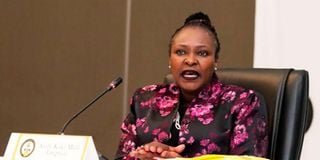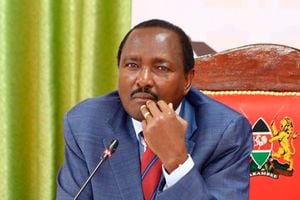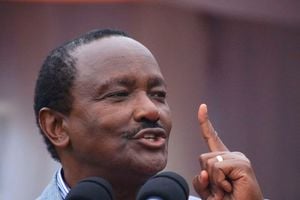
Ambassador Koki Muli during her interview at the KICC in Nairobi on July 16, 2021, for the position of commissioner of the Independent Electoral and Boundaries Commission.
For the third time in a row, Ambassador Koki Muli has failed in her bid to join the Independent Electoral and Boundaries Commission (IEBC) as a commissioner.
Some of her attempts have been so close and yet so far after she made it to the shortlist of three to be submitted to the President for subsequent appointment.
The renowned election expert is currently fighting in court to be included in the nine-member IEBC selection panel. Her current bid is an apparent scaling down of her ambitions to serve as IEBC chairperson.
In early 2009, she was one of eight lawyers interviewed for the same position by the Parliamentary Select Committee on the Constitution. Cecil Miller Jr was selected, only to be rejected by Parliament.
In 2011, Ms Muli lost the race to become Kenya's first electoral chief under the 2010 constitution when Ahmed Issack Hassan took up the post.
Ms Muli had been shortlisted alongside Mr Hassan and Mr Murshid Abdalla. Their names were forwarded to former President Mwai Kibaki and former Prime Minister Raila Odinga – during the grand coalition government – by the recruitment panel then chaired by Dr Ekuru Aukot.
In 2021, Ms Muli was again interviewed for the post of IEBC Commissioner. She was among 36 people shortlisted to replace commissioners Roselyne Akombe, Connie Nkatha Maina, Paul Kurgat and Margret Mwanchanya, who resigned after the 2017 elections.
She was unsuccessful. Instead, Juliana Cherera, Francis Wanderi, Justus Nyang'aya and Irene Masit were appointed. The four left the commission following a dispute over the results of the 2022 presidential election.
Ms Muli is proud of her credentials as the only African woman qualified to train and accredit students in electoral processes under the Bridge (Building Resources in Democracy, Governance and Elections) curriculum.
Her achievements were recognised by the Kriegler Commission, which investigated the post-election violence that followed the disputed 2007 elections.
In the current dispute, the High Court has refused to set aside an ex parte order made by the Political Parties Dispute Tribunal (PPDT) recognising Dr Augustus Kyalo Muli as the duly elected representative of the minority coalition – Azimio La Umoja One Kenya Coalition – on the selection panel.
“That I decline to issue ex parte orders of stay of execution of the PPDT judgment at this stage. That it shall be served and the parties return for directions on 19/9/2024,” Justice Janet Mulwa ruled on September 12.
The PPDT had earlier observed that Dr Muli was validly elected to represent the minority party/coalition of parties on the IEBC selection panel.
The tribunal found that Azimio’s attempt to "unilaterally replace the complainant after the elections process is unlawful and contravenes the principles of fair administrative action under Article 47 of the constitution."
“While gender parity is an important consideration, it should be addressed through proper legal frameworks and not through post-election alterations of results. It is hereby declared that Dr Augustus Kyalo Muli was duly elected on July 26, 2024, to represent the minority party/coalition of parties on the IEBC selection panel,” PPDT ruled, leaving Ms Muli’s fourth attempt hanging by a thread.
Under the Political Parties Liaison Committee (PPLC), the majority coalition, the minority coalition and the non-parliamentary parties were to pick a nominee each.
Mr Evans Misati was elected to represent non-parliamentary parties, while Mr Nicodemus Bore was picked to represent the majority party.
For the minority coalition, Dr Muli of National Liberal Party (NLP) was voted in, defeating Wiper’s Ambassador Koki Muli in an election that was presided over by IEBC.
But the opposition coalition tried to replace Dr Muli with Amb Muli, triggering the current court battle.
The Nation understands that there was a consensus among some of the Azimio affiliated parties to have a Wiper candidate elected to the minority slot.
Wiper had even managed to convince Janet Mwema of Chama Cha Uzalendo, linked to Machakos Governor Wavinya Ndeti, to drop out in favour of Amb Muli. However, efforts to persuade Dr Muli to drop out failed.
Dr Nelson Makanda and Fatuma Saman, who were on the previous selection panel, were retained by the Inter-Religious Council, while Tanui Andrew Kipkoech was selected by the Institute of Certified Public Accountants of Kenya.
The Law Society of Kenya (LSK) has one slot and the Parliamentary Service Commission (PSC) has two slots. The two PSC slots will be filled by candidates from Raila Odinga's Orange Democratic Movement (ODM) and President William Ruto's United Democratic Alliance (UDA).







